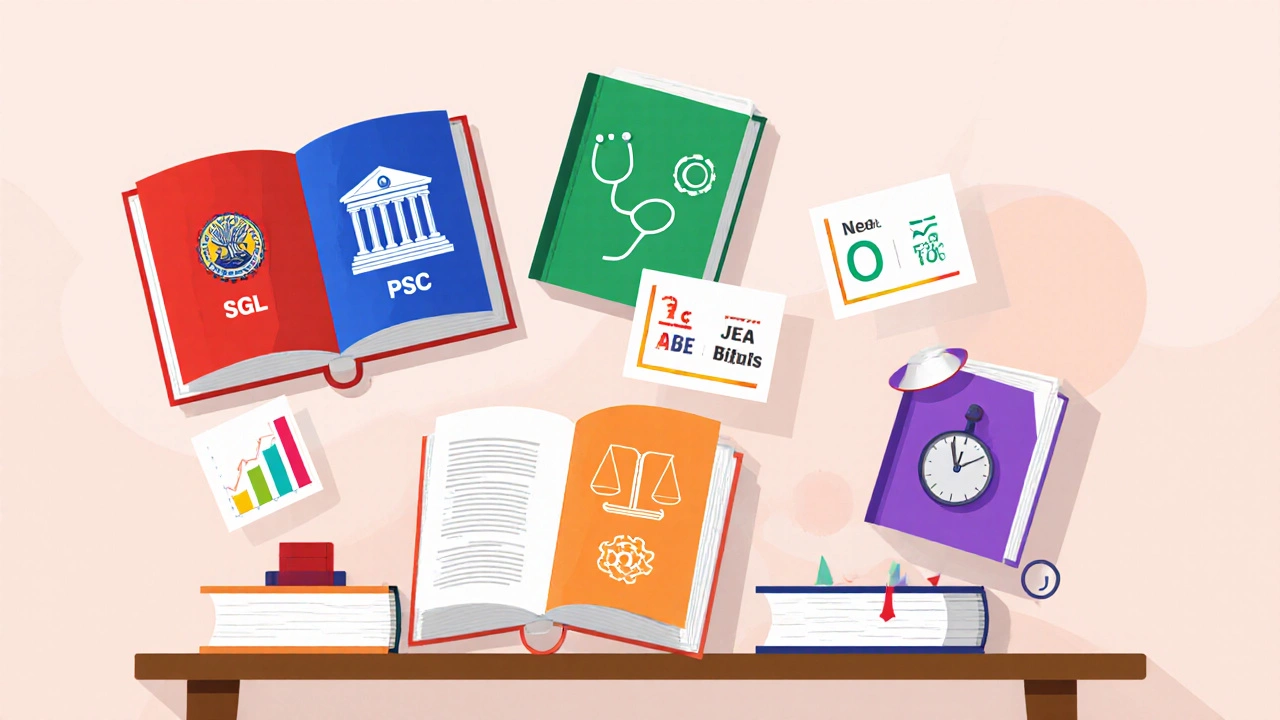Easiest Competitive Exam Selector
Select your preferences to find the easiest competitive exam for 2025:
Your Recommended Exam
Pass Rate:
Applicants per Seat:
Suggested Prep Hours:
Main Subjects:
Why This Exam Is Easy
- Clear Syllabus: Each paper lists exact topics, leaving little room for speculation.
- Predictable Question Patterns: Most questions are objective, enabling quick practice with MCQ banks.
- Abundant Free Resources: Official portals provide past papers, answer keys, and detailed exam notices.
- Moderate Competition: While still competitive, the applicant-to-seat ratio is lower than for JEE or NEET.
When you hear the term easiest competitive exam, you probably picture a test that needs less time, fewer topics, and a decent chance of clearing it on the first try. The reality is that ‘easy’ is relative - it depends on your background, the exam’s pattern, and how many seats are up for grabs. Below you’ll find a straight‑forward rundown of the exams that consistently rank as the most beginner‑friendly in India, how to measure their difficulty, and a step‑by‑step plan to start scoring.
Quick Takeaways
- SSC CGL, Bank PO, and State PSC exams are often labelled the easiest due to clear syllabi and moderate competition.
- Look at pass rates, number of applicants, and average preparation hours to gauge difficulty.
- A focused 3‑month study plan can get most beginners ready for these exams.
- Free government portals, YouTube channels, and standard reference books cover 80% of the syllabus.
- Start with a mock test, identify weak areas, and adjust your schedule weekly.
How We Rank ‘Easy’ Exams
To keep the comparison fair, we evaluated each exam on four concrete attributes:
- Pass rate - higher pass rates usually signal a less brutal selection process.
- Applicant pool - fewer candidates per seat reduce competition.
- Preparation time - the total hours most successful candidates report studying.
- Scope of topics - exams covering a narrow set of subjects are quicker to master.
Data comes from official results sheets released between 2020‑2024 and from surveys published by leading coaching institutes.
Top 5 Easiest Competitive Exams (2025)
| Exam | Typical Pass Rate | Applicants per Seat | Suggested Prep Hours | Main Subjects |
|---|---|---|---|---|
| SSC CGL is a nationwide exam for recruitment to Group B & C posts | 12% | 5:1 | ≈250hrs | General Awareness, Reasoning, Quantitative Aptitude, English |
| Bank PO is the entry‑level exam for public sector banks | 10% | 4:1 | ≈220hrs | Reasoning, Quant, English, General Awareness |
| State PSC (e.g., Maharashtra PCS) is a state‑level public service exam | 15% | 3:1 | ≈200hrs | General Studies, Reasoning, Quant, Language |
| NEET is the national medical entrance exam | 17% | 10:1 | ≈300hrs | Physics, Chemistry, Biology |
| JEE Main is the engineering entrance exam for NITs and IIITs | 20% | 12:1 | ≈350hrs | Physics, Chemistry, Mathematics |
Why SSC CGL, Bank PO, and State PSC Stand Out
These three exams share a common DNA that makes them more approachable for first‑time candidates:
- Clear syllabus - each paper lists exact topics, leaving little room for speculation.
- Predictable question patterns - most questions are objective, enabling quick practice with MCQ banks.
- Abundant free resources - the official portals provide past papers, answer keys, and detailed exam notices.
- Moderate competition - while still competitive, the applicant‑to‑seat ratio is lower than for JEE or NEET.
For someone juggling a day job or college, the 200‑250hour prep window is realistic.

Designing a 3‑Month Study Plan
Below is a week‑by‑week blueprint that works for all three exams. Adjust the daily hour count based on your personal schedule, but keep the weekly total around 15‑20hours.
- Weeks1‑2: Foundation - skim the official syllabus, gather study material (NCERT, standard reference books), and take a diagnostic mock to spot blind spots.
- Weeks3‑6: Core Learning - allocate 2days per subject. For example, Monday/Tuesday for Quantitative Aptitude, Wednesday for Reasoning, Thursday for English, Friday for General Awareness (or State language). Finish each topic with 10‑15 practice questions.
- Weeks7‑9: Intensive Practice - switch to full‑length mock tests every alternate day. Review each mock within 2hours, noting recurring error types.
- Weeks10‑12: Polishing & Revision - focus on weak sections, memorize key formulas, and revise notes daily. The final week should be light, with one mock and a quick recap of all shortcuts.
Tip: Use a spreadsheet to log mock scores and tag each error (e.g., “time‑pressure”, “conceptual”). This creates a visual map of improvement.
Recommended Resources (Free & Low‑Cost)
All the resources listed below have proven effective for thousands of crackers. They’re chosen because they align with the objective‑type format of the easy exams.
- Official portals - SSC, IBPS, and State PSC websites host past papers, exam notices, and answer keys (no charge).
- YouTube channels - Channels like Unacademy SSC, Study IQ Bank PO, and Mahendra's IAS break down tricky reasoning and GK questions in 5‑minute videos.
- Standard books
- Quantitative Aptitude - R.S. Aggarwal (2volumes)
- Reasoning - Arun Sharma
- General Awareness - Lucent’s Current Affairs (updated monthly)
- Mock test platforms - Oliveboard, Testbook, and Adda247 offer free daily quizzes and paid full‑length tests.
Common Pitfalls and How to Avoid Them
Even the easiest exams can trip you up if you ignore these traps:
- Skipping the official syllabus - many aspirants chase extra topics that never appear.
- Over‑relying on rote memorization - speed comes from practiced shortcuts, not blind recall.
- Ignoring time‑management in mocks - a paper may feel easy, but you still need to finish within 2hours.
- Neglecting mental health - burnout kills performance; schedule short breaks and light exercise.
Set a weekly checkpoint: if you miss a mock score target by more than 5%, revisit your study timetable.
Next Steps After Choosing Your Exam
Once you’ve settled on, say, SSC CGL, follow these three actions:
- Register on the official SSC portal and download the latest admit card.
- Create a dedicated study folder (Google Drive or local) with syllabus PDF, notes, and mock test results.
- Join a community (Telegram group, Discord server) that shares daily current‑affairs updates - it keeps GK fresh without extra effort.
By staying organized, you’ll turn the ‘easiest’ label into a genuine advantage.
Frequently Asked Questions
Which exam requires the least preparation time?
Among the listed exams, the State PSC (e.g., Maharashtra PCS) typically needs around 200hours of focused study, making it the shortest on average.
Is it safe to rely only on free online material?
For the easy exams, yes. The official syllabus, past papers, and reputable YouTube channels cover 80‑90% of the content. Premium courses become useful only for advanced shortcuts.
How many mock tests should I attempt before the actual exam?
Aim for at least six full‑length mocks: three in the core‑learning phase, two during intensive practice, and one as a final check.
Can I crack SSC CGL while working full‑time?
Absolutely. Many successful candidates allocate 2‑3hours per evening and a longer session on weekends, reaching the 250hour target in three months.
What’s the best way to track my progress?
Use a simple spreadsheet: columns for date, mock score, time taken, and error categories. Update it after every test - patterns become instantly visible.
